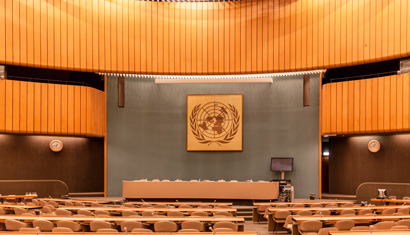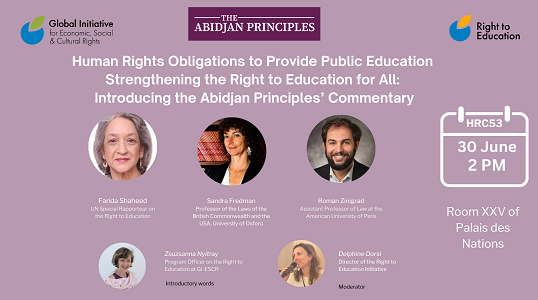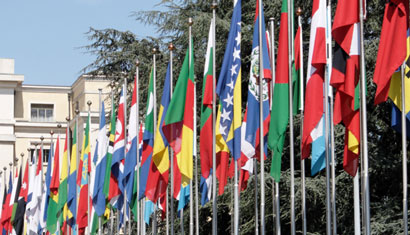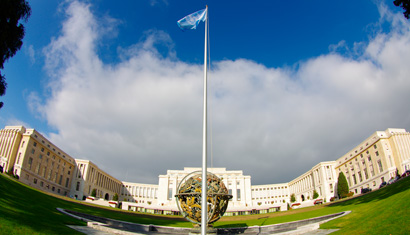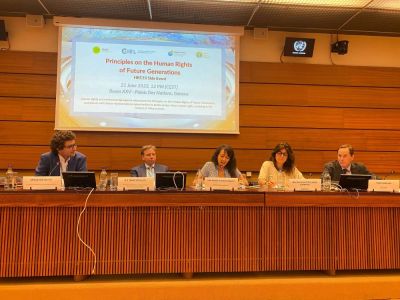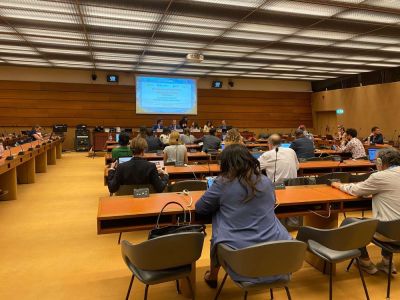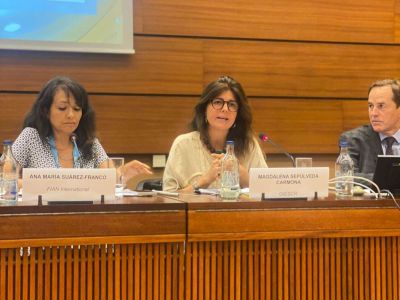As informed previously, Chad will be reviewed by the Committee on Economic, Social and Cultural Rights (CESCR) during its upcoming 74th session (25 September and 13 October 2023). See: https://tbinternet.ohchr.org/_layouts/15/TreatyBodyExternal/MasterCalendar.aspx?Type=Session&Lang=En
In this regard, the CESCR has only received one parallel submission from Civil Society on the status of the implementation of the International Covenant on Economic, Social and Cultural Rights in Chad, which is a submission dating back to the List of Issues. (https://tbinternet.ohchr.org/_layouts/15/treatybodyexternal/SessionDetails1.aspx?SessionID=2608&Lang=en).
At this stage, the Committee has unfortunately not received any NGO report on the actual human rights situation in the country with a focus on economic, social and cultural rights.
As you know parallel reports are crucial for a successful periodic review of States, therefore we encourage CSO that work on the promotion and protection of economic social and cultural rights in Chad to submit information for the upcoming dialogue between the CESCR and Chadian authorities.
CESCR has established guidelines on how to submit a report:
https://www.ohchr.org/en/treaty-bodies/cescr/guidelines-civil-society-ngos-and-nhris
You can also find information on the ESCR net, here: https://www.escr-net.org/parallel-reporting/guide/how-to-engage
CSOs are invited to participate in this review step by submitting alternative reports through the submission system by 28 August 2023. We have been informed that exceptional submissions can be received until September 8, 2023.
If you are interested in submitting a parallel report, you can also be assisted by the Treaty Body Capacity Building Programme. Please reach out to Ms Asita Maria Scherrieb at
74th Session of the Committee on Economic, Social and Cultural Rights 25 September - 13 October 2023
This time, the Committee will be reviewing the reports submitted by the following States:
- Armenia
- Brazil
- Chad
- France
- Qatar
- State of Palestine.
Stakeholders at the national level can participate in the review process, either through written submissions or informal briefings with CESCR. The Civil Society and National Human Rights Institutions (NHRI) submission deadline will be mid-August, six weeks before the session.
Alternative reports must be submitted through the Committee’s online submission system by 28 August 2023. Stakeholders will also be able to request the Committee to hold informal briefings through the submission system by 28 August 2023.
During the session, the CESCR will also follow up on its observations to:
- Bosnia and Herzegovina
- Finland
- Latvia
Civil society and NHRI are also invited to participate in this step of the review by submitting alternative reports to the submission system by 28 August 2023.
If you need more information about submissions or to organising an informal meeting, please get in touch with the CESCR Secretariat directly at:
73rd Pre-Sessional Working Group Committee on Economic, Social and Cultural Rights 16 - 20 October 2023
Following the 74th session, between 16 and 20 October 2023, the CESCR will hold its 73rd Pre-Sessional Working Group meeting. In this meeting, the CESCR will adopt the Lists of Issues for the upcoming reviews of the following States:
- Colombia
- Lao People’s Democratic Republic
- Netherlands
- Russian Federation
- Uruguay
- Zimbabwe
Stakeholders at the national level can participate in the selection of issues, either through written submissions or informal briefings. The deadline for submissions by civil society and NHRI will be by early August, ten weeks before the session. Written submissions and requests for informal briefings concerning the Lists of Issues have to be made through the Committee’s online submission system by 7 August 2023.
For more information on submissions and informal briefings, please get in touch with the Secretariat of the CESCR at:
On June 30th, 2023, the Global Initiative for Economic, Social and Cultural Rights (GI-ESCR) held a side event to the 53rd regular session of the Human Rights Council titled “Human Rights Obligations to Provide Public Education - Strengthening the Right to Education for All: Introducing the Abidjan Principles’ Commentary”.
The objective of the panel discussion was to introduce the recently published expert commentaries on the Abidjan Principles and foster a discussion of their continued relevance for realising the right to free, quality and inclusive public education for all.
Delphine Dorsi, Director of the Right to Education Initiative (RTE), chaired the discussion. and included the following speakers:
- Zsuzsanna Nyitray, Program Officer on the Right to Education, Global Initiative for Economic, Social and Cultural Rights (GI-ESCR): Introducing the Abidjan Principles and the Commentary.
- Sandra Fredman, Professor of the Laws of the British Commonwealth and the USA, University of Oxford) – Equality and non-discrimination in the application of the Abidjan Principles.
- Roman Zinigrad, Assistant Professor of Law at the American University of Paris: Obligations to Respect, Protect, and Fulfil the Right to Education in the Context of Private Involvement in education.
- Farida Shaheed, UN Special Rapporteur on the Right to Education: Reflections on the continued relevance on the Abidjan Principles for guiding States regarding their human rights obligations to ensure the right to free, quality, inclusive, public education for all.
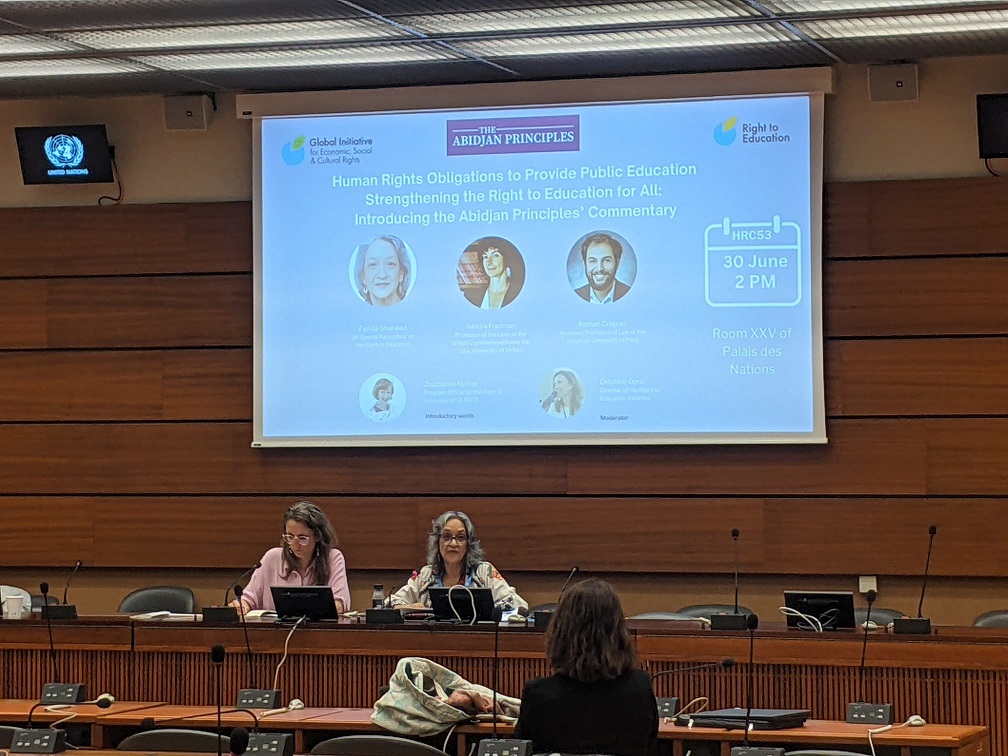
"Education is not a commodity. We hear much about Public-Private Partnerships; this is not a solution to bad governance. The solution is better governance, not PPPs." Farida Shaheed, United Nations Special Rapporteur on the Right to Education.
The Abidjan Guiding Principles on the human rights obligations of States to provide public education and regulate private actors’ involvement in education (Abidjan Principles), adopted in February 2019 by a group of experts on the right to education, unpack the complex legal architecture of the right to education, including the provision of public education, the regulation of private actors and the various financing arrangements for education. To advance the understanding of the Abidjan Principles and thus support their practical application, several experts involved in their drafting process committed to providing the reasonings and justifications behind them. The first pieces of these legal commentaries were published by the Oxford Human Rights Hub in May this year.
30 people in person attended the event, and 30 people were following the conversation on-line.
On 27 June 2023, GI-ESCR with the Right to Education Initiative (RTE) submitted a written statement supporting the UN Special Rapporteur on the right to education’s report “Securing the right to education: advances and critical challenges”.
In her report, 25 years after the establishment of the mandate on the right to education, the Special Rapporteur, Ms Farida Shaheed, reviews achievements, particularly on how the right to education is understood today and the obligations it entails, as well as contemporary and emerging issues that need to be considered to ensure the right to education for all, today and in the future.
The written statement welcomes the Special Rapporteur’s holistic approach to education, embracing all its dimensions and recalling the need for an expanded vision of the right to education through life and a commitment to education as a public common good.
Furthermore, it reinforces the Special Rapporteur’s remarks on
- The need for reinforcing the implementation of the right to education, including through accountability and monitoring processes, stressing that this cannot be achieved without adequate financing;
- Financing education, which is a legal obligation under international law and entails the allocation of maximum available resources for the progressive realisation of the right to education, including resources that could potentially be mobilised, in particular through progressive taxation;
- Prioritising the funding of free, high-quality public education and ensuring that it is truly inclusive and ensuring that private actors’ involvement is regulated and support given to private educational institutions meet certain requirements, as laid down in the Abidjan Guiding Principles on the human rights obligations of States to provide public education and regulate private actors’ involvement in education (Abidjan Principles).
- Understanding the profits-driven agenda of digital technology companies amidst the rapid development of the digitalisation of education to safeguard against private interests that could be detrimental for the realisation of the right to education for all.
Here is our statement:
GI-ESCR welcomes the recent announcement of the revitalisation of the Group of Friends of Economic, Social, and Cultural Rights (GFESCR) at the United Nations in Geneva and commends Portugal for this initiative.
For more than 30 years, Portugal has been a champion in promoting and protecting economic, social and cultural rights at the UN. They lead on the bi-annual comprehensive resolution regarding the realisation of economic, social, and cultural rights across all nations and participate in many other ESCR-related initiatives.
In light of the ongoing global pandemic and the numerous crises confronting people worldwide, GI-ESCR views this renewed effort to reactive the GFESCR as a timely call for the urgent need for the international community as a whole to commit to the value of economic, social, and cultural rights. As this year marks the 75th anniversary of the Universal Declaration of Human Rights, it is crucial to reinforce the indivisibility and interdependence of all human rights.
GI-ESCR is committed to collaborating with the GFESCR to strengthen international human rights law and procedures to combat social and economic injustices. We are convinced that together we will ensure that the rights and dignity of all persons are upheld, and that equality is achieved for all.
The Group of Friends of ESCR is a broad association of States, United Nations agencies, funds and programmes, as well as civil society institutions, which have coalesced around a shared commitment to promoting economic, social and cultural rights. (Source)
On 21 June our Executive Director, Magdalena Sepúlveda participated at a side-event jointly co-hosted by the Global Initiative for Economic, Social and Cultural Rights, the Centre for International Environmental Law, FIAN International, and World Future Council on the Principles on the Human Rights of Future Generations.
The event convened human rights and climate change experts and activists to discuss a new landmark legal reference tool that fleshes out the human rights standards to respect, protect and realise the rights of future generations. As part of the Drafting Committee, our Executive Director shared key insights on the structure and relevance of this tool to advance a fair and sustainable future for all in the face of the escalating climate emergency.
The panel of the side-event was composed by:
- Sébastien Duyck, Center for International Environmental Law (CIEL)
- Magdalena Sepúlveda Carmona, Global Initiative for Economic, Social and Cultural Rights (GIESCR)
- E. Marc Bichler, Permanent Mission of the Grand Duchy of Luxembourg
- Aoife Nolan, Council of Europe European Committee of Social Rights (TBC)
- Todd Howland, Office of the High Commissioner for Human Rights (OHCHR)
Moderator: Ana María Suárez-Franco, FIAN International
This event is part of the ongoing efforts to push the frontiers of the human rights framework to address the gaps in legal protection that arise from the climate emergency. You may read the concept note of the event here:
On 25th and 26th May, our Executive Director Magdalena Sepúlveda, participated in the ninth Glion Human Rights Dialogue (Glion IX) organised by the Republic of Korea and the Universal Rights Group, in partnership with the Permanent Missions of Morocco, Fiji and Thailand.
The Glion Human Rights Dialogue is a high-level event which brought together around 40 human rights practitioners and thinkers. It was designed to provide an informal space for open exchange, as well as new and innovative thinking. The theme of the 2023 Glion Human Rights Dialogue was "Placing new and emerging technologies at the service of human rights and democracy: what is the role of the Human Rights Council and its mechanisms?"
For more information visit: https://www.universal-rights.org/
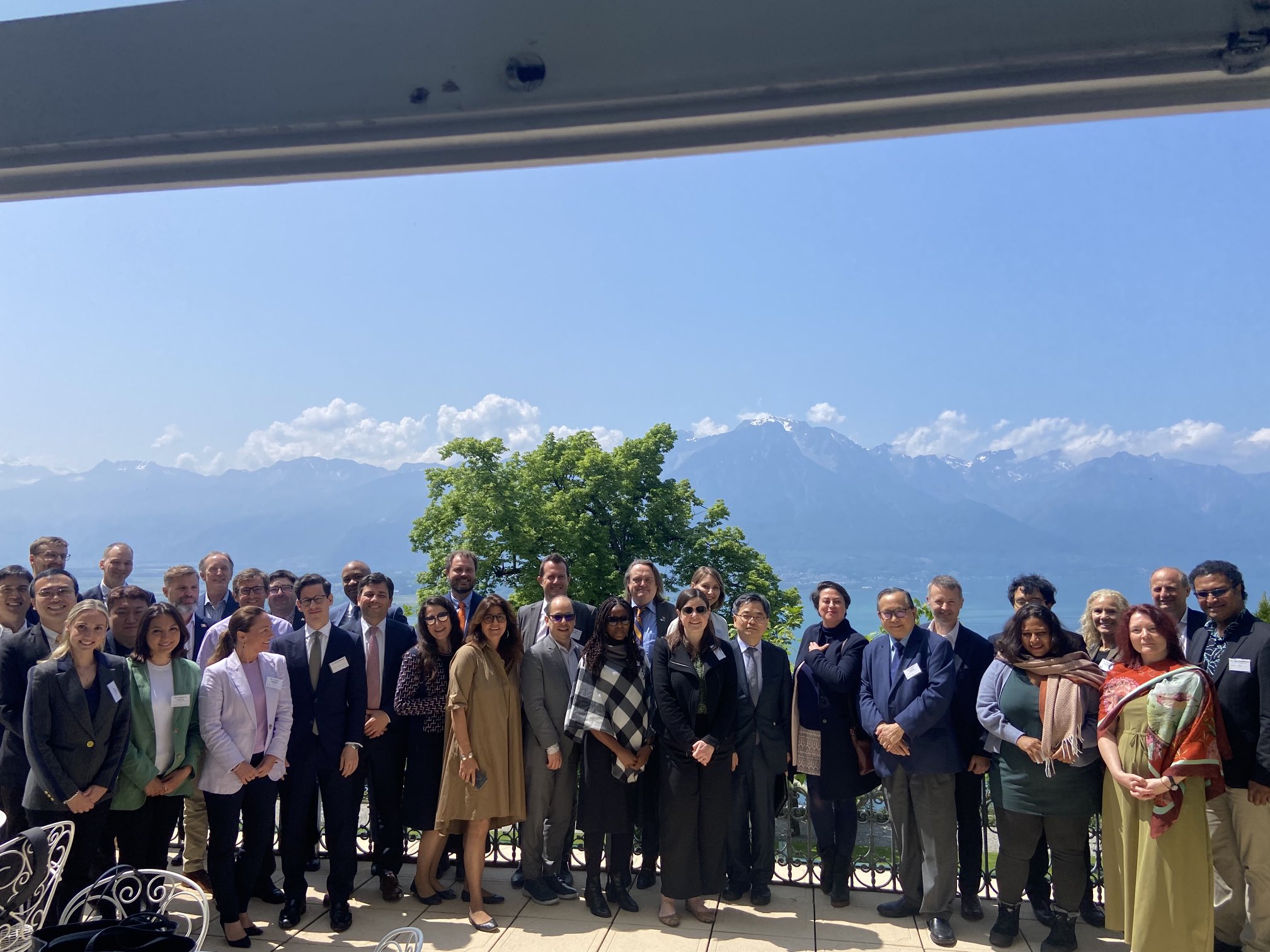
Our submission to OHCHR focused on the human rights standards of the right to the highest attainable standard of physical and mental health under International Law in the context of the establishment and regulation of health services for the treatment of drug dependence.
When private actors provide health-related services, they should be subject to strict regulations that impose on them so-called ‘public services obligations’.
Private healthcare providers should be prohibited from denying access to affordable and adequate services, treatments or information. This means that existing standards on the right to health should be applied in the context of private actors’ involvement in the right to health.
Our view is that OHCHR’s report should recommend that, in the context of drug-related health policies, specifically those related to the treatment of drug dependence, States are obliged to:
- Ensure that all health services should be accessible, culturally appropriate, of quality, adequately funded, accountable, and transparent;
- Count with well-developed legal frameworks and regulations on private actors to ensure that public service obligations are fulfilled and the human rights of drug users are respected;
- Strictly monitor all healthcare providers under their jurisdiction, including private, to verify that they comply with regulatory requirements established in the national and international legal frameworks, including the human rights of drug users.
Read the complete submission here.
On May 23, The Global Initiative for Economic, Social and Cultural Rights co-sponsored the launch of the Principles and Guidelines on Human Rights and Public Health Emergencies.
The Principles are the result of a 2-year effort led by the Global Health Law Consortium and the International Commission of Jurists (ICJ). As part of its strategic efforts in progressive normative development, The Global Initiative for Economic, Social and Cultural Rights has been closely involved in drafting and discussing the Principles. Thanks to this continued effort, GI-ESCR pushed for including in the Principles special emphasis monitoring and regulating private actors in healthcare, drawing on human rights investigations conducted in Kenya, Nigeria and Italy as well as conceptual work on the interpretation of the right to health by UN Treaty Bodies.
Magdalena Sepulveda Carmona, GI-ESCR’s executive director and former Special Rapporteur on extreme poverty and human rights, has participated in the event as a speaker, endorsing the principles and emphasizing the urgent need to build strong, resilient, and rights-aligned public healthcare services to effectively prevent and respond to public health emergencies and to reverse the commercialisation of healthcare services.
The Principles address these important issues, for instance, in Principle 9.1. ‘States must strengthen and develop a universal, resilient, functional, integrated, accountable, rights-based and people-centred health system for the entire population’. Likewise, Principle 10.3 on maximising resources for pandemic prevention and preparedness importantly recognises that States should ‘where necessary, take effective measures to direct or otherwise regulate the use of privately held, owned or operated resources, particularly those resources held, owned or operated in private healthcare sectors within a State’s jurisdiction; and b. coordinate with private actors, particularly those with resources held, owned or operated in the private healthcare sectors within the State’s jurisdiction’.
Magdalena also recalled that to respect, protect and fulfill human rights, including the right to health, there is an urgent need for strengthened monitoring and regulation of private healthcare actors, such as private healthcare providers, private insurance companies and pharmaceutical companies, because this was tragically evident during the COVID-19 pandemic. In the human rights investigations we conducted in Kenya and Nigeria, we found that individuals living in marginalised urban areas often seek healthcare in low-cost, unsafe, and unlicensed private clinics, nursing homes and laboratories.
The Human Rights & Public Health Emergency Guidelines address these problems in Principle 5 on ‘Human rights duties relating to non-State actors’ as well as in Principle 9.3 and Principle 5.1: ‘States must regulate and monitor engaged non-State actors to prevent them from impairing the enjoyment of human rights and provide for redress and accountability’ as part of the duty of states to protect human rights when a third party is involved.
The Guidelines also importantly reiterates that this applies to private actors operating domestically and cross-nationally and involves a duty of states to ensure effective collaboration and coordination between all healthcare actors to effectively respond to public health emergencies. The Guidelines also importantly explicitly mention such as ‘private healthcare providers and insurers, and manufacturers of health goods, facilities and technologies’.

